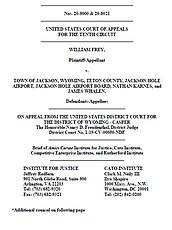Evaluate Frey’s allegations to see if you would reach the same conclusion: As Frey passed through the screening checkpoint at Jackson Municipal Airport (Wyoming), he triggered a body-scanning machine that alerted to his groin area. After a security employee assured Frey the alert was a false positive caused by his belt, he was ordered to submit to a pat-down search of his groin area. Frey requested that he merely reenter the body scanner without his belt to clear the false positive. His suggestion was ignored, and he was told that if he did not submit to the pat-down he would not be allowed to board his flight—or even leave the airport.
A municipal police officer was summoned after Frey again refused to consent to the invasive search. The officer arrested Frey after refusing Frey’s repeated request to either reenter the scanner or leave the airport. Frey was then subjected to an invasive pat-down by the officer, who found no unlawful items. Frey was detained in jail for three hours, during which he was interrogated and denied repeated requests to speak to an attorney. His wife, seated in the lobby of the jail, was even told that her husband’s prolonged detainment was due to his request for a lawyer, which she eventually found for him.
Frey contends that his constitutional rights were violated during the arrest and subsequent detention. But the federal district court not only rejected Frey’s claims, but also found them to be so frivolous as to order him to pay the defendants’ court fees and sanctioned his lawyers for bringing the lawsuit.
Now before the U.S. Court of Appeals for the Tenth Circuit, Cato has joined the Institute for Justice, Competitive Enterprise Institute, and Rutherford Institute in filing a brief arguing against the fee and sanctions award. This penalty—typically reserved only for claims deemed “fanciful,” “fantastic,” and “delusional”—would have a chilling effect on future civil rights litigation, particularly against municipal defendants that are the target of most such suits. Regardless of the ultimate merits of his claims, which we believe to be strong, they aren’t meritless, frivolous, or otherwise illegitimate.
If the Tenth Circuit affirms the lower court’s order, it would send an unsettling signal to citizens hoping to seek relief against government infringements of their civil liberties. Potential plaintiffs would likely forgo legitimate claims of constitutional abuses for fear of bearing a substantial financial risk. The could should make clear that sanctions should be reserved for plaintiffs and counsel bringing baseless claims.

